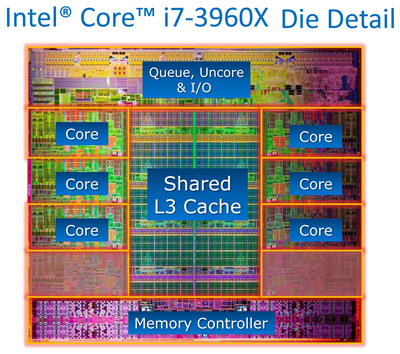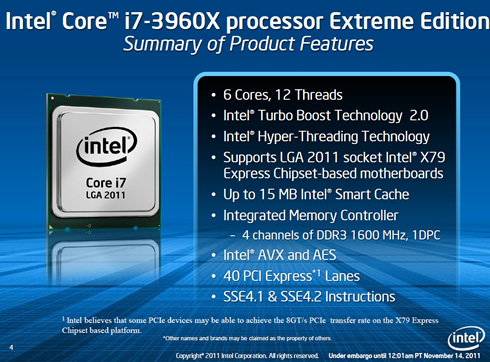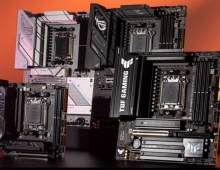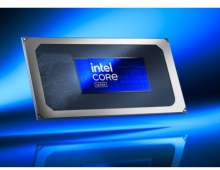
Intel Releases The Core i7-3960X Extreme Edition Six-core CPU
Intel on Monday announced what it called its fastest chip to date for PCs, the six-core Core i7-3960X Extreme Edition processor, which is based on the Sandy Bridge microarchitecture and designed for use in high-end desktops.
The processor is targeted at enthusiasts such as gamers and is compatible with the new Intel X79 Express chipset.
The Core i7-3960X runs at a default clock speed of 3.3GHz, cranking up to 3.9GHz per core depending on performance required, using Intel's Turbo Boost Technology 2.0. The chip has 15MB of L2 cache and four channels of memory.

Built using the 32nm process, the Core i7-3960X has a 130W TDP, which is the same for the Intel Intel Core i7-990X Extreme Edition processor currently available at the market and based on Intel's previous Westmere architecture. On the other hand, the new CPU is compatible with the new LGA2011 socket and due to architectural changes, the chip packs the memory controller but not any integrated graphics, meaning that you won't get the Quick Sync feature either - a very efficient way to transcode videos.

The LGA 2011 CPU also features a QPI bus controller used to tie together processors in multi-socket systems. In addition, the PCI Express graphics bus controller in the new systems has moved into the procesor, which leaves the chipset to perform the role of the South Bridge. The PCI Express controller supports up to 40 PCIe lanes, which may be configured in different ways: 2 X x16 & x8 or x16 & 3x8 or configurable x16 & 2x8 2x4. The processor also supports quad-channel memory running up 1,600 MHz (12.8GB/s)

The chip is priced at US$990 for 1,000 units. It will compete with the AMD's eight-core FX-series chips, which started shipping last month.
Intel also introduced the six-core Core i7-3930K chip, which operates at 3.2GHz and can be clocked up to 3.8GHz. The chip has 12MB of cache, four memory channels, and is priced at $555.
The Intel Core i7-3960X and the Intel Core i7-3930K are fully unlocked so overclockers and enthusiasts who want to modify performance settings can do so with simple utilities.
The Intel X79 Express chipset that supports this new LGA 2011 socket platform delivers 6Gb/s Serial ATA (SATA) ports and additional PCIe 2.0 lanes. The CPUs are connected to the chipset through DMI 20GB/s, The X79 Express chipset also supports USB 2.0 x 14, Gigabit Ethernet, PCI Express x1 X 8, SATA 6Gbps X 2, SATA 3Gbps X 4 and HD audio.

Intel is offering an aluminum cooler with the new processor priced at about $20. This cooler will be efficient enough to dissipate the heat off processors with 130 W TDP.

A liquid cooling solution is also available for overclocking enthusiasts. Priced at $90, it has been designed by Asetek. In this case they offer a modification with a radiator large enough for a single 120 mm fan. The cooling efficiency of this liquid-cooling system is lower than that of high-performance air-coolers so Intel's specific offering may not be so successful.

The Core i7 3960X may be the world's fastest desktop CPU, but it seems to require a heavily threaded workload to prove it. The 3960X should not be any slower than the fastest Sandy Bridge CPUs, but it should also not be tremendously faster either.
The Core i7-3960X runs at a default clock speed of 3.3GHz, cranking up to 3.9GHz per core depending on performance required, using Intel's Turbo Boost Technology 2.0. The chip has 15MB of L2 cache and four channels of memory.

Built using the 32nm process, the Core i7-3960X has a 130W TDP, which is the same for the Intel Intel Core i7-990X Extreme Edition processor currently available at the market and based on Intel's previous Westmere architecture. On the other hand, the new CPU is compatible with the new LGA2011 socket and due to architectural changes, the chip packs the memory controller but not any integrated graphics, meaning that you won't get the Quick Sync feature either - a very efficient way to transcode videos.

The LGA 2011 CPU also features a QPI bus controller used to tie together processors in multi-socket systems. In addition, the PCI Express graphics bus controller in the new systems has moved into the procesor, which leaves the chipset to perform the role of the South Bridge. The PCI Express controller supports up to 40 PCIe lanes, which may be configured in different ways: 2 X x16 & x8 or x16 & 3x8 or configurable x16 & 2x8 2x4. The processor also supports quad-channel memory running up 1,600 MHz (12.8GB/s)

The chip is priced at US$990 for 1,000 units. It will compete with the AMD's eight-core FX-series chips, which started shipping last month.
Intel also introduced the six-core Core i7-3930K chip, which operates at 3.2GHz and can be clocked up to 3.8GHz. The chip has 12MB of cache, four memory channels, and is priced at $555.
CPU clock (GHz) |
Turbo Clock (GHz) |
Number of Cores |
L2 (MB) |
Memory |
TDP(W) |
|
3960X |
3.3 |
3.9 |
6 |
15 |
4ch DDR3-1600 |
130 |
3930K |
3.2 |
3.8 |
6 |
12 |
4ch DDR3-1600 |
130 |
3820 |
3.6 |
3.9 |
4 |
10 |
4ch DDR3-1600 |
130 |
990X |
3.46 |
3.73 |
6 |
12 |
3ch DDR3-1066 |
130 |
2700K |
3.5 |
3.9 |
4 |
8 |
2ch DDR3-1333 |
95 |
The Intel Core i7-3960X and the Intel Core i7-3930K are fully unlocked so overclockers and enthusiasts who want to modify performance settings can do so with simple utilities.
The Intel X79 Express chipset that supports this new LGA 2011 socket platform delivers 6Gb/s Serial ATA (SATA) ports and additional PCIe 2.0 lanes. The CPUs are connected to the chipset through DMI 20GB/s, The X79 Express chipset also supports USB 2.0 x 14, Gigabit Ethernet, PCI Express x1 X 8, SATA 6Gbps X 2, SATA 3Gbps X 4 and HD audio.

Intel is offering an aluminum cooler with the new processor priced at about $20. This cooler will be efficient enough to dissipate the heat off processors with 130 W TDP.

A liquid cooling solution is also available for overclocking enthusiasts. Priced at $90, it has been designed by Asetek. In this case they offer a modification with a radiator large enough for a single 120 mm fan. The cooling efficiency of this liquid-cooling system is lower than that of high-performance air-coolers so Intel's specific offering may not be so successful.

The Core i7 3960X may be the world's fastest desktop CPU, but it seems to require a heavily threaded workload to prove it. The 3960X should not be any slower than the fastest Sandy Bridge CPUs, but it should also not be tremendously faster either.




















